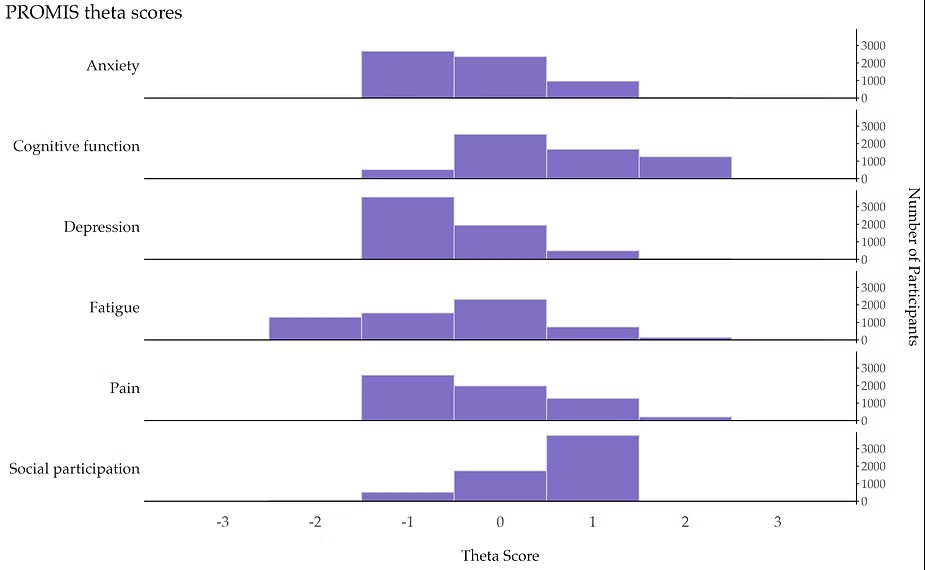How demographics shape health: Insights from the California Teachers Study

Adriana Rochelle
Master’s Student, Online MPH in Population and Health Sciences
 This article was originally published in the California Teachers Study blog.
This article was originally published in the California Teachers Study blog.
When we think about what affects our health, we often think of genetics, exercise, or diet. But what about our age, income, or whether we’re retired? As part of my Applied Practice Experience (APEx) at the University of Michigan School of Public Health, I worked in partnership with the California Teachers Study (CTS) to explore how these kinds of demographic factors relate to people’s physical, mental, and social health.
I chose this project because I'm passionate about understanding how broader life factors shape well-being. Having a background in health communications and passion for health equity, I was especially interested in exploring how health data can reflect people’s lived experiences and inform more responsive public health efforts.
How I studied the link between demographics and health
I worked with the vast CTS dataset to examine the relationship between demographic factors and health outcomes. CTS is a large, long-term, statewide cohort study established in the 1990s to explore factors influencing women’s health among female educators in California. It’s an ideal resource to explore questions and identify potential trends for further examination. The research question I aimed to answer was: Do people with different age, income, retirement status, or education level report different experiences with their physical, mental, and social health?
The demographic factors I looked at to answer this question included characteristics like a person's age, race, income, and education level. To evaluate health outcomes, I used Patient-Reported Outcomes Measurement Information System (PROMIS) measures. PROMIS is a set of measures developed by the National Institutes of Health (NIH) that evaluate physical, mental, and social health. PROMIS lets patients report their own health experiences—which gives a fuller picture of how people are really doing. Theta scores are the numerical representation of these responses. They typically range from -4 to 4, where 0 is the national average; a higher score means better health for that category, while a lower score means worse health.
The goal of my research was to explore whether CTS participants’ PROMIS responses varied based on their demographic and lifestyle characteristics. In other words, do people with different backgrounds report their health differently?
Using data from the CTS, I analyzed PROMIS theta scores for six health areas—fatigue, pain interference, anxiety, depression, cognitive function, and ability to participate in social roles. I looked for patterns based on five demographic factors: age, race, marital status, retirement status, and income.

Figure 1: Distribution of Theta Scores for each PROMIS measure
How background shapes well-being
My analysis revealed statistically significant associations between PROMIS scores and several key demographic factors. Older participants generally reported lower levels of anxiety and depression, but higher levels of fatigue and pain interference. This suggests that while emotional well-being may improve with age, physical health challenges become more prominent.
Retired participants showed higher cognitive function scores compared to those still working. This may reflect the mental benefits of reduced work-related stress and points to the importance of supporting cognitive health across the retirement transition. Additionally, income was strongly associated with mental health. Findings showed higher-income participants reported lower anxiety and depression scores. This reinforces the connection between financial stability and well-being and reflects the continued need to address mental health disparities linked to income.
Finally, participants with a higher level of education, particularly those holding advanced degrees, consistently reported more positive health outcomes across PROMIS measures. This may suggest that greater health literacy or access to resources contributes to better overall well-being.
What these results mean for real people
These findings show that health isn’t just about personal choices and genetics; it’s also shaped by the social and economic conditions we experience. Even within a similar group like California educators, clear differences in health outcomes were shown. Understanding these patterns can help public health professionals tailor support more effectively. For example, younger adults may benefit from more mental health resources, while older adults may need help managing fatigue and pain. Along with this, the strong link between income and mental health also highlights the importance of addressing financial stress as part of overall well-being. From a health equity perspective, this research reinforces the need to create systems where everyone regardless of background, has the opportunity to achieve good health.
Continuing the research
Future research should focus on further exploring how demographic and lifestyle factors interact to shape health outcomes. These studies could also include diverse populations to provide a more comprehensive understanding of health disparities. Additionally, tracking PROMIS measures over time—instead of a single survey point—would allow researchers to investigate changes over the life course. This would offer valuable insights into how demographic factors may be associated with well-being at different life stages.
About the author
 Adriana Rochelle is a graduate student pursuing a Master of Public Health (MPH) in
Population and Health Sciences at the University of Michigan with a focus in Health
Behavior and Health Equity. Her professional experience includes health communications,
project management, and research.
Adriana Rochelle is a graduate student pursuing a Master of Public Health (MPH) in
Population and Health Sciences at the University of Michigan with a focus in Health
Behavior and Health Equity. Her professional experience includes health communications,
project management, and research.
“My experience working with the California Teachers Study (CTS) has been a valuable opportunity to strengthen my skills in data analysis, statistics, and using patient-reported health measures,” Rochelle says.
The California Teachers Study works in partnership with the Michigan Public Health’s Population and Health Sciences program to offer Applied Practice Experiences (APEx) in research to online graduate students in the Online MPH program. Learn more about the partnership.
